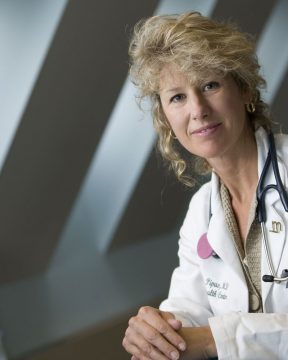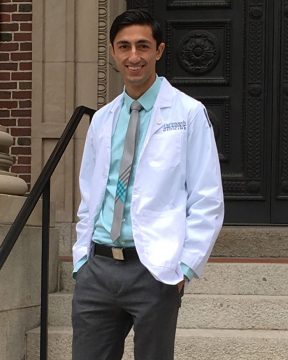Wellness is more than the absence of disease
In 2011, while receiving her MPH from The Dartmouth Institute, and listening to a medical school commencement speaker encouraging graduates to lead change and strive to transform the world, Catherine Pipas, MD, MPH ’11, a professor of community and family medicine at Geisel and a family physician, took stock of her own health and that of those around her.

She thought about how the cultural norm within the healthcare profession of putting aside your own needs—sleep, exercise, time spent with family and friends, and healthy eating—to care for others contributes to the high burnout rate among clinicians. Burnout, the main reason physicians turn away from practicing medicine, remains relatively stable within the general population, but continues rising among healthcare professionals—including medical students. In medicine, burnout is defined as a response to the demanding nature of the work with emotional exhaustion, depersonalization, and a sense of personal ineffectiveness.
Envisioning a culture of wellness that prioritizes sustained personal well-being among healthcare providers and medical students as a means of enhancing patient care, rather than as a sign of weakness, Pipas solidified her belief that medical professionals’ ability to improve the health of our population is dependent not only on their ability to effectively care for patients, but the ability to also care for themselves.
“It begins with us,” she says. “We are the culture. Changing our own behavior can change our environment and culture to one that supports sustained wellness for ourselves and our colleagues. We aren’t asking anything more of ourselves than we ask of our patients. If not physicians, who better to model wellness?”
While teaching a Dartmouth undergraduate class—The Science, Practice, and Culture of Wellness—Pipas met John Damianos '20 (D '16). They reconnected during his first year at Geisel in the Patients and Populations course where students are required to develop a MaD (make a difference) project—Pipas was his advisor. Damianos’ project was a personalized advising approach to holistic wellness for medical students modeled on his experience, in both high school and college, with an evidence-based approach to reduce high-risk drinking.

The two stayed in touch and their conversations culminated in developing an elective pilot course for Geisel medical students and faculty centered on supporting self-care and creating a culture of wellness. By defining wellness in a holistic way, Pipas linked components of self-awareness, self-care, and self-improvement, into a toolkit for modeling health and building resilience to stave off burnout. The evidence-based strategies for sustaining wellness and building resilience covered in the Culture of Wellness course drew from cases in Pipas’ recently published book, A Doctor’s Dozen: Twelve Strategies for Personal Health and a Culture of Wellness.
Ten faculty and 10 students enrolled in the 10-week course. Throughout, Pipas and Damianos co-facilitated and shared their own vulnerabilities and struggles with sustaining wellness to create a community of support and to illustrate how these strategies play out in real life. Pipas says, “When we look at cultural issues and self-reflect in order to understand our emotions and actions, it becomes powerful for everyone.” Cultural norms and behavior are difficult to change—it requires a paradigm shift. And for students to change an entrenched culture, they need faculty support, time, tools, and permission, Pipas notes.
“Those of us advocating for change believe self-reflection is an absolute competency you need in order to be able to sustain and model personal health as a physician, but how you get there is individualized—you should have autonomy in self-assessing and determining what skills you need,” she explains. Pipas believes that when students recognize the strategies they use for managing chronic stress when they are doing well, they can recreate those strategies when things go awry.
“I’ve been thinking about this for a long time,” Damianos adds. “This type of education is a game-changer and that’s not something I say lightly. We need to look at what medical schools are doing to combat burnout.”
Unfortunately, chronic stress and burnout is not unique to medicine, Pipas admits. This fall she began working within Dartmouth’s Tuck School of Business’ Health is Everyone’s Business wellness initiative. She will be facilitating Culture of Wellness sessions for faculty, students, and staff during winter and spring terms both at Geisel and Tuck.
“I’m excited about the potential of what we’re doing here at Dartmouth to overcome this crisis,” she says.